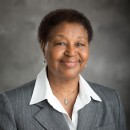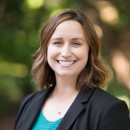Research Office News
Pages
 Ayesha Ghazi-Edwin Receives a Certificate of Appreciation from the James T. Neubacher Awards Committee
Ayesha Ghazi-Edwin Receives a Certificate of Appreciation from the James T. Neubacher Awards CommitteeENGAGE Program Director and Lecturer Ayesha Ghazi-Edwin received a Certificate of Appreciation from the James T. Neubacher Awards Committee, a unit of the U-M Council for Disability Concerns. The certificate is in acknowledgment of her efforts to advance the cause of accessibility and justice for the disability community. In addition to her work at the school, Ghazi-Edwin is also the Fund Development and Research Specialist at Detroit Disability Power, a disability justice nonprofit organization in Detroit. She also serves on the Michigan Social Work's Inclusion and Access Taskforce.
Established by the university’s Council for Disability Concerns in October 1990, the award is a memorial to James T. Neubacher, a university alumnus and columnist for the Detroit Free Press who advocated for equal rights and opportunities for people with disabilities.
- November 5, 2020
- Learn more »
 Letha Chadiha Receives the 2020 Career Achievement Award
Letha Chadiha Receives the 2020 Career Achievement AwardRose C. Gibson Collegiate Professor Emerita of Social Work Letha Chadiha is receiving the 2020 Career Achievement Award from the Association for Gerontology Education in Social Work. This award recognizes a faculty member who is an outstanding leader in social work education and aging with significant achievements including major research and publications, prominence in promoting education in gerontology, and mentoring faculty and students interested in aging.
- November 5, 2020
- Ayesha Ghazi-Edwin Featured Activist in “i.Detroit”
ENGAGE Program Manager and Lecturer Ayesha Ghazi-Edwin is one of the 100 Detroit activists featured in "i.Detroit," a mixed media project by British artist Marcus Lyon. She was selected after a 6-month nomination process as an activist who is making a significant difference in Detroit. The project includes a book of portraits, a smartphone app and a 7-inch vinyl record; it also maps the DNA of its subjects to create what Lyon calls a “human atlas” of the city.
- October 16, 2020
- Learn more »
 Lisa Fedina Awarded a 2020 Young Investigator Grant from the American Foundation for Suicide Prevention
Lisa Fedina Awarded a 2020 Young Investigator Grant from the American Foundation for Suicide PreventionAssistant Professor Lisa Fedina was awarded a 2020 Young Investigator Grant from the American Foundation for Suicide Prevention. She will conduct a national survey with young adults ages 18-24 to identify protective factors for suicide that promote resilience among young adults, particularly those most at risk.
“We know that people often do not have isolated experiences with violence, but studies have not yet measured the range of victimization experiences in order to understand its full burden on mental health. This study represents an important step to build this underdeveloped area of research through theory-driven, person-centered approaches, allowing for greater accuracy in predicting suicidal behaviors by accounting for the effects of violence victimization over time and factors that may support resilient trajectories among youth,” says Fedina.
- October 8, 2020
- Learn more »
- Charles Garvin Named NASW Pioneer
Professor Emeritus Charles Garvin was recently inducted into the NASW Social Work Pioneers. Pioneers made important contributions to the social work profession, and to social policies through service, teaching, writing, research, program development, administration and legislation.
- October 7, 2020
- Learn more »
- Shanna and Leo Kattari Edit New Book Social Work and Health Care Practice with Transgender and Nonbinary Individuals
Assistant Professor Shanna Kattari and Lecturer Leo Kattari have edited a new book “Social Work and Health Care Practice with Transgender and Nonbinary Individuals.” Assistant Professor Ashley Lacombe-Duncan and Joint PhD student Matthew Bakko contributed chapters.
The book examines issues across the lifespan of transgender and nonbinary individuals whilst synthesizing conceptual work, empirical evidence, pedagogical content, educational experiences and the voices of transgender and nonbinary individuals.
- October 6, 2020
- Learn more »
 Trina Shanks Named Harold R. Johnson Collegiate Professor of Social Work
Trina Shanks Named Harold R. Johnson Collegiate Professor of Social WorkCongratulations to Trina Shanks who was named the Harold R. Johnson Collegiate Professor of Social Work. Shanks is the director of the School of Social Work Community Engage Program as well as the newly launched Center for Equitable Family & Community Well-Being, which connects the university with community leaders in Detroit and in Washtenaw County. This is the second endowed professorship honoring the School’s former dean and supports a scholar whose teaching and research address the advancement of race relations, diversity and inclusion." Trina Shanks has made significant and influential contributions as a researcher and leader. She is a valued colleague, teacher and mentor," said Dean Lynn Videka.
- October 1, 2020
 Lisa Wexler Receives Centers for Disease Control and Prevention Grant
Lisa Wexler Receives Centers for Disease Control and Prevention GrantProfessor Lisa Wexler has received a Centers for Disease Control and Prevention Grant for her project, Family Safety Net: Developing an Upstream Suicide Prevention Approach to Encourage Safe Firearm Storage in Rural and Remote Alaskan Homes. The study will support, encourage and assess safe firearm storage practices relevant to Alaska Native families. Alaska has suicide rates far above national averages, including a teen suicide rate among Alaska Natives 18 times higher than the rate for other American teens.
- September 28, 2020
- Learn more »
 Parenting in Context Research Lab Found Parents are Overwhelmed
Parenting in Context Research Lab Found Parents are OverwhelmedA new study from Parenting in Context Research Lab found parents are overwhelmed, kids are anxious and economic hardship is common during the pandemic. The pandemic presents parents with new challenges on how best to prepare and support their children for a different school experience. In the early days of the pandemic, nearly 80% of parents were educating their children at home.
- September 21, 2020
- Learn more »
 Kathryn Maguire-Jack Received R01 Grant from the Centers for Disease Prevention and Control
Kathryn Maguire-Jack Received R01 Grant from the Centers for Disease Prevention and ControlAssociate Professor Kathryn Maguire-Jack has received an R01 grant from the Centers for Disease Prevention and Control to examine the preventive impacts of childcare subsidies and paid family leave policies on child maltreatment and intimate partner violence. She is a co-investigator of the 3-year $1.05 million project led by Prevent Child Abuse America. Maguire-Jack is working with researchers from the Prevent Child Abuse America and Casey Family Programs
- September 11, 2020